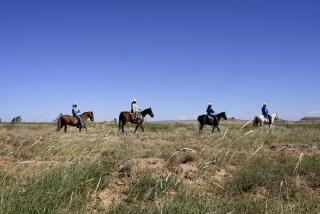Tribal casinos sue California for more time to qualify legal sports betting measure amid coronavirus

- Share via
SACRAMENTO — A coalition of California Native American tribes sued the state Tuesday seeking more time to qualify a sports betting initiative for the statewide ballot, arguing that the state‘s coronavirus shutdown kept them from collecting voter signatures in recent months.
The lawsuit comes as state officials express concerns that the virus could impede the ability of Californians to go to the polls to vote, leading Gov. Gavin Newsom last month to order ballots to be mailed to the state’s 20.6 million voters.
The new legal claim was filed by the Coalition to Authorize Regulated Sports Wagering, which represents more than 25 Native American tribes throughout California and hopes to qualify an initiative for the 2022 ballot that would legalize sports betting at tribal casinos and horse racing tracks.
The coalition originally hoped to make the Nov. 3 ballot but said it has run out of time, although the state says it could still qualify by June 25 to get on this year’s ballot.
The coalition is seeking an extension of at least 90 days in hopes of qualifying for the following election. State law gives proponents of a ballot measure 180 days to gather the signatures needed, regardless of the timing of the election in which it will be considered by voters.
“This is about seeking to preserve the people’s democratic right to pursue an initiative during the pandemic,” said Kenneth Kahn, chairman of the Santa Ynez Band of Chumash Indians. “Tribal leaders temporarily suspended signature gathering as a sacrifice to protect everyone’s public health.”
The tribes began circulating petitions for the initiative in January and the lawsuit says the July 20 deadline for turning in 997,139 signatures to make the 2022 ballot “presents an impossible burden that prevents Petitioners from exercising their right to propose legislation by initiative, as guaranteed by the State Constitution.”
Enforcing the deadline would also violate the tribes’ rights under the 1st Amendment to the U.S. Constitution to petition the government for a redress of grievances, according to the lawsuit, filed in Sacramento County Superior Court against Secretary of State Alex Padilla.
The tribes spent $7 million to collect 971,373 signatures by mid-March when Newsom issued the stay-at-home order and would face hardship if they miss the deadline and have to start over collecting signatures for a ballot in a future year, the suit says.
The lawsuit asks the court to extend the deadline until all counties in California have moved to the third of four stages in Newsom’s phased reopening plan for the state, or at least 90 days.
Padilla’s staff members are “reviewing the litigation and do not have specific comment on it at this time,” said Sam Mahood, a spokesman for the Secretary of State.
The initiative would allow sports betting at tribal casinos and horse tracks but not at rival card clubs or online, and would create a 10% tax on sports gaming revenue at the racetracks.
A competing ballot measure opposed by the tribes is being considered by the state Legislature. It would more broadly allow sports betting, including online, and give card clubs the discretion to continue offering some card games the tribes believe violate their exclusive tribal gambling rights.
State Sen. Bill Dodd (D-Napa) said his bill to legalize sports betting could generate $200 million in tax and fee revenue for the state in the first year and up to $700 million when the market is mature.
The Senate Governmental Organization Committee voted to support the bill last week after Dodd argued it was important to bring sports betting out of the shadows in California.
“The legalization of sports wagering gives California an opportunity to provide much-needed revenue to our state during tough economic times,” Dodd said. “Because sports betting will continue to occur regardless of its legality.”
Twenty-two other states have legalized sports betting in response to a 2018 U.S. Supreme Court decision that overturned the federal ban on sports betting, but California’s voters must agree to change the state Constitution for the practice to be allowed here.
More to Read
Sign up for Essential California
The most important California stories and recommendations in your inbox every morning.
You may occasionally receive promotional content from the Los Angeles Times.











